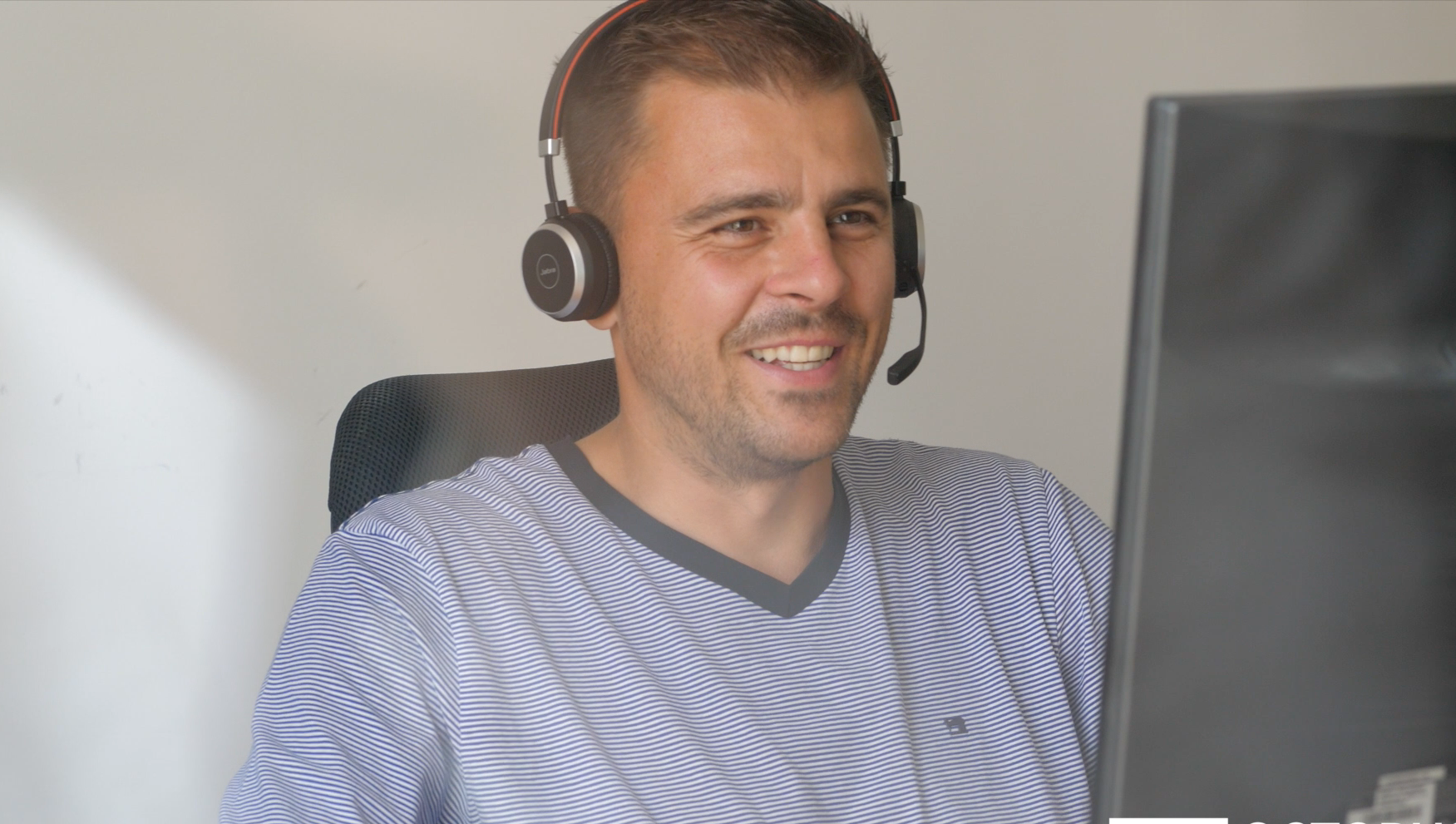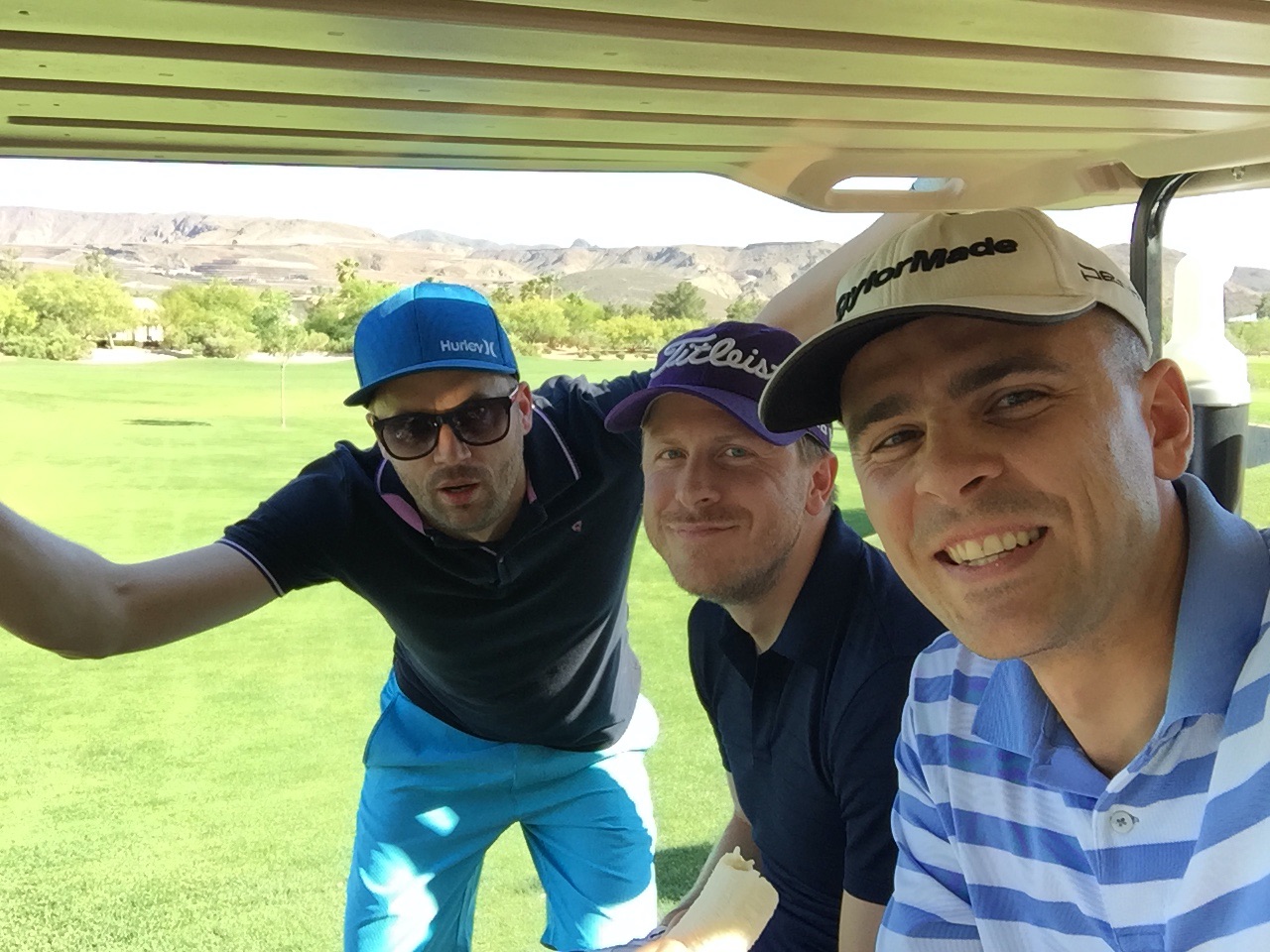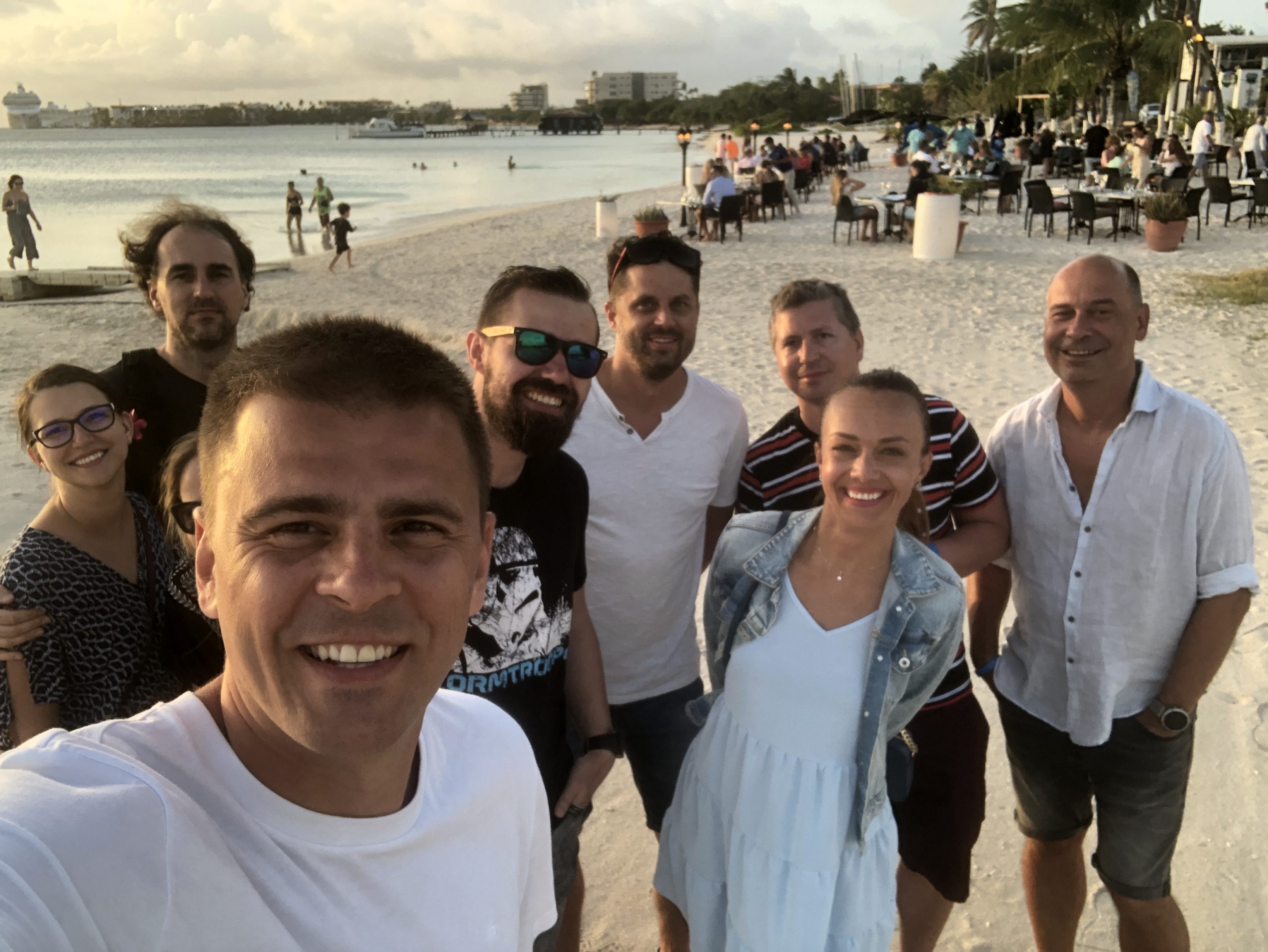 Interview at Gabriel Janko, Sales Director Octopus.
Interview at Gabriel Janko, Sales Director Octopus.
–When and where were you born?
I was born in Slovakia, known as Czechoslovakia at that time. I was born in the year 1982. My mother is a teacher while my father is an engineer. I am the second child in a family of three; I had two siblings so you can say I had a happy childhood.
– What was your favourite subject in school?
I always liked Math and Physics; I was quite good at those. I always liked languages and as I said I studied Hungarian in school but from the early years we had to study Slovak, then, later on, I studied English. At university, I studied Spanishand I picked up Russian after university. So, I like to learn languages but while I was younger, I liked maths and physics because it was easy for me.
– Why did you choose to study Hungarian in Prague and not Budapest?
When I was 18, I had a big decision to make on whether to go to Budapest or Bratislava, or Prague. I thought that going to Budapest might not expose me to learning new things because I was familiar with the place. I decided to choose Prague because it was a new challenge, completely out of my region and comfort zone. I had only been to Prague once. It was a new language and a new culture. And ever since then, I have resided in Prague.
– Under what Faculty did you major?
Faculty of IT Technologies and IT management.
– Why did you choose IT Technologies?
I was always interested in computers. My father had this computer from work which I usually played with while I was at home. I chose the University of Economics because of the two subjects that were requested -Math and English- which was a combination of two subjects I liked. And also, I was not interested in studying any economics-related courses like macroeconomics, so I decided to study IT at the University of Economics. It was a good combination for me. I liked IT and courses related to computers, yet I did not want to study in a technical university in Prague because it would be too technical. I was trying to find a balance between business and IT.
– Was it a private or public university?
It was a public university.
– What was your first job?
I worked quite a lot when I was in the University and during the summer, I did summer jobs in different countries.
– What kind of jobs?
All kinds. From hotels to restaurants to summer camps in the US. One of my first serious jobs was in Oracle. I was a sales representative for some corporate clients and my job involved selling Oracle products.
Was this when you were in school or post?
It was during school.
– How long did you work there?
I didn’t plan to stay at Oracle for too long so it was a good opportunity to gain experience besides classroom experience. After that, I knew I had to prepare for state exams and I had to complete my university program. After I graduated, I started to work at Octopus Newsroom.
– How long did you work with the Newsroom and why did you decide to stay for so long?
When I first joined Octopus, I was fresh out of school so I enjoyed the traveling that came with it. I enjoyed the trips to all the exhibitions, trade shows, and customer visits. I visited a lot of new places which was interesting. I also liked the environment, the job, the product, and most importantly, my co-workers were quite interesting and nice. I had a lot of clients who became really good friends so I had no reason to leave. There were always new challenges ahead and as we are constantly developing and hiring more people, we still maintained a close, friendly, and even family-like workplace. There was really no reason to change work.
– You said you had new challenges, what kind of challenges do you mean?
There were always new projects to close which may take a long time. Sometimes a year or two. Projects in the broadcast industry do not end in a day but rather, take several years. So, when you start working on a new project, you don’t want to leave it halfway and when it is finished, a new product is being developed and you don’t want to miss the launch of the new product, in the meantime, you get started with another new client and so it goes. In other words, there’s always a new activity to do.
– What is your main achievement in your career?
I wouldn’t want to go into details of projects because it was mainly a team effort but the areas I am particularly proud of is in my ability to satisfy our clients, improve our, and help build a positive and friendly work environment where no one is afraid to communicate what they feel. And most especially, I am proud of the company’s smooth and successful running throughout these years.
– What are your hobbies?
I have a lot of hobbies but particularly my favourite sport is basketball. I have always played basketball since childhood but besides basketball, I also like to play tennis and golf.
– What is your position in basketball?
Depending on the team I am playing with. In my current team, I play power forward or small forward, but I also played in teams where I was the tallest, so I had to play centre. Normally I am small for a centre, I am only 195cm tall.
– Do you have a family?
Yes, I have a wife and two daughters.
About Octopus
-When did your company’s product first enter the market? How and when was the decision to establish the company made?
The company started in 1999. The founders were originally working at TV Nova in Prague. When TV Nova was looking for a new newsroom system, the founders of Octopus decide to leave the company and develop a system on their own. So, the first version of the product was released in 2000/2001 which was for TV nova, in Prague. After that, they sold it to another customer in Slovakia following that, we were lucky to be involved in some very large project in India which instantly pushed us to the international market.
– What is the current position of your company? How has your company been further developed and what results have you achieved?
Our third ever customer was Aaj Tak owned by TV Today in India which till today is one of the most successful news channels in India. They have been using Octopus for 20 years and thanks to this customer and this experience, we developed a very good product which was later used by high-profile customers such as Euro News, Czech TV, Al Jazeera English, and other big customers. After TV Today started to use it, a lot of new TV stations were established in that whole region, and they all liked Octopus a lot. So, we built a very large market share in Europe and in Soth East Asia which were for us, our very first large markets.
What are your latest products? How have they been improving, and which tools and upgrades do they provide for your IT customers?
Until 2018, we have been focusing only on the newsroom computer system, which is very successful now. At the last launch, we launched Octopus x which already contains a story-centric approach, it has built-in support for AI tools; it has a very good mobile application; it runs on any platform like Mac OS and Windows, and so on. So that’s one of our most popular products. Recently, we have also introduced iReporter, a professional video gathering portal developed to enable our customers to interact with their viewers. This means that if a TV station wants to use Octopus iReporter, firstly, they will need to provide a mobile application for their viewers. So, they can make video recordings of things happening around them and send these footages to the TV stations. The TV station may use these footages for TV production or publish them on social media. It is a nice new add-on to Octopus, but this can be used also by customers who are not using octopus; it can serve as a stand-alone product or work with other production systems as well.
We also have another new product since last year called Octopus KO:R and it is a product for collaboration and planning. It was developed for customers who need a planning tool for their content irrespective of whether they have a newsroom or not. The typical customers of ko:r would be TV stations with an old or no newsroom system that need to improve their planning processes.
– How did you come to work with Euro News?
Euro News was very specific because they are broadcasting in many different languages simultaneously so every rundown and story that is been created has many different language versions. In the beginning, there were seven different languages and today there are more than ten languages, so they needed a newsroom system to adequately support these specific versions. And one of the strengths of Octopus from the very beginning has been its flexibility. We have a lot of configuration options and in addition, if a customer comes with a special requirement, we are always willing to make custom development especially when necessary. I think this was one of the important things for Euro news, the newsroom system they were going to buy had to support their special workflow and Octopus was able to support it. In Octopus they had one rundown which constituted a story containing seven different language version scripts which were very unique at that time.
– How has your product increased the effectiveness, accessibility, and agility of editors, engineers, and media managers?
As I said it is a flexible system with a lot of options, modules, and possibilities. It has everything from news galleries to planning and of course content creation and archive. Basically, for content creation, Octopus supports story-centric workflow or rundown-centric workflow which can create stories for rundowns, social media, and rep. Primarily, it is one tool that enables different people from different groups and departments to collaborate and plan together. This helps to save energy, money, time, and human resources. From a management point of view, it is a very cost-effective solution, it is built up from different modules, they can pay for only the modules they choose to use. Once they invest in the newsroom system, they own the system for as long they want. From a technical point of view, it is a stable and reliable system and we have a lot of feedback from our customers that their technicians have never had any cause to make changes, restart or reboot their system; so, this further proves that the system is reliable. Another positive attribute that the engineers appreciate is that all the configuration changes needed are in the user interface so they don’t need to go through different files like in some older systems they are used to.
What about customization, can you customize the system according to the client’s preference?
Yes, as I said, that’s one of the strengths of the system. During the whole development process, we always consider the customer requests which are added as a configuration option so we don’t change the behaviour of the system. So, if another customer comes with their preferences, we can also add it as an option and make it different from the other customers. There are different configuration options in the system and this is actually one of the biggest discussions we have with the customers at the beginning. The most interesting part about Octopus is that the custom changes are easily adjustable so in a situation whereby a client changes their mind about the workflow, we can easily change everything in minutes.
– Which new projects have you developed recently and which was the most challenging of them?
I would like to highlight 3 recent projects. We worked on a huge project in Germany called Welt belonging to Axel Springer SE, they had been using an underdeveloped newsroom system that they needed to upgrade. They had a very customized solution with a lot of different special workflows that they wanted to keep so we had to put in maximum effort to adjust Octopus to fit their requirements and the project was very successful. 6 months later, they were moving into a new building, so they bought new technologies and equipment but they kept Octopus and we had to install the system in the new building which was even better with the new technologies. Shortly after that, their sister company – BILD one of the biggest newspaper companies in Germany- wanted to launch a TV station and chose to have an Octopus system as well, because they liked the setup in Welt as well as other new technologies. This Axel Springer project took almost 2 years. There were a lot of requirements on how the system should function, contained in a document of about 300 pages. We worked with their requirements and produced a great result.
Another customer we are about to conclude a project for is called CH Media in Switzerland. It is the biggest private broadcast group in Switzerland and they are merging five different regional TV stations into one building. These five TV stations each had their newsroom system, their workflows, and teams but the goal was that they would be sharing a single Octopus Newsroom system. Octopus had to demonstrate its flexibility by configuring a system that would merge all the five workflows and satisfy the users. So currently, this project is in its user-training phase and would go on-air within a few weeks.
– How has the pandemic and the cancellations of the major trade shows like NAB influenced the business of Octopus?
When they cancelled the first NAB in 2020, at that point, there was no major impact because customers were still very used to NAB so, we created a series of webinars which was successful with hundreds of people attending. Then, in September, we created another webinar for IBC but at that time people had a lot of webinars and online meetings and the traffic was not as much as the first NAB. We’ve learned how to work online, how to make presentations, and communicate with our clients effectively online. I think we can do pretty much everything online but it’s not the same. Personally, as I said earlier, one of my key motivations is meeting people and building relationships which is quite difficult online. We have still maintained our good reputation, brand, and products. I don’t think the cancellation has had a huge impact, but we have missed the meetings with our customers and friends.
– How’s your relationship with Russia’s IT companies and how have you been able to develop your relationship with your Russian customers?
I’ve always liked and admired our Russian customers and not just Russia but the whole region. I started to visit Moscow over 10 years ago and I have built a very good relationship there with a lot of people and customers. Of course, we are very proud of our first installation in Russia which was RBC and we are celebrating the 10th anniversary of the RBC installation. Actually, Natali, the marketing director has just published a video about RBC’s 10th anniversary which was recorded by the RBC team. We have a very good relationship with them and some other customers like Match TV, Life 78 in St. Petersburg, and many others who are using Octopus but also, we have good relationships with people who are not using Octopus right now.
– What are your plans and priorities for the next five years, can you give us a product roadmap?
We have a lot of big plans to develop new features in all of our products – iReporter, KO:R, and Octopus X. So, we will release new versions of these products. We are working with a couple of high-profile customers which I am unable to discuss because it is not yet official. But once they become official, they will have a huge impact on the future of the company and push us more into the spotlight so that we can provide a lot of new features for our customers. We’ve also started working on new AI tools and face recognition software to be made available for customers that request it.
– Who are your main contractors and technological partners?
It depends, in Russia we worked with Studio Service a lot, with the Match TV project, we worked with New Tek. In other countries, we worked with Comtel, Offtech, Broadcast Solutions as well as Grass Valley, who often act as main contractors in our common projects in the surrounding region. One of the big advantages of Octopus is that we provide only the newsroom system and for the rest, we work with different technology partners that provide applications such as MAM, Playout, or Graphics. They are happy to work with us because they get a very good newsroom system into their solution without the need for rivalry or competition.


 Interview at Gabriel Janko, Sales Director Octopus.
Interview at Gabriel Janko, Sales Director Octopus.






